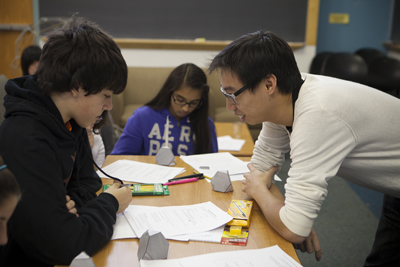Math Explorer's Club caters to middle and high school students
By Jocelyn Wu

From Oct. 13 to Nov. 17, six committed middle and high school students have been commuting as long as 90 minutes to attend the Math Explorer's Club on campus to explore mathematical concepts and problem-solving strategies.
In a typical session, students tackle worksheets, make 2-D drawings and 3-D models, and engage in discussions on such topics such as congruence, dimension, optimization, number theory and cryptography, under the guidance of graduate student volunteers Ka Yue (Daniel) Wong and Laura Escobar, both in the field of mathematics. On a recent Saturday, for example, the group learned about 3-D geometric solids, planes and basic group theory by discussing the ideas and experimenting with 3-D models.
"This is something I've always wanted to do," said Escobar. "I'm excited to see people outside of the math department, especially younger people, who are very motivated to do math."
And motivated, they are. Most of the students live outside of the Ithaca City School District, and some must commit to long commutes to attend the club on Saturday mornings. Eighth-graders Olivia Delorenzo and Lisa Kanbur, for example, attend middle school in Oswego, which is a 90-minute drive from Ithaca.
Kanbur shrugged off the formidable commute with a smile, saying, "I like Math Explorer's Club. ... I thought I could learn extra math when I go to high school and when I do other math courses." At Owego Middle School, Delorenzo and Kanbur take Integrated Algebra, a class that teaches eighth- and ninth-grade mathematics in one year. Other students attending the club come from Ithaca High School, Dryden Middle School and Lansing High School.
"While chatting with some colleagues at the beginning of my first year at Cornell, someone made the comment that in middle and high school most of the extracurricular math activities available to students were competition-based," said Tasia Raymer, visiting assistant professor of mathematics who restarted Math Explorer's Club this semester after years of club inactivity. "I thought it would be nice if we could offer a program at Cornell that was math-based, but didn't culminate in a competition."
With Mary Ann Huntley, director of mathematics outreach and K-12 education activities at Cornell, Raymer developed ideas for the program using material from the old Math Explorer's Club Web page, recruited graduate student instructors and advertised the program to math instructors and clubs around the area to revive the club.
"[My goal was to] get a club started at Cornell in which K-12 students would be exposed to areas of mathematics that are not emphasized in the standard K-12 curriculum. An important aspect of the club [is] to foster discussion among the participants and give them a chance to develop ideas related to the mathematics rather than lecture them on the topic," added Raymer.
"I like that it goes a lot beyond what you would be talking about in math class," said William Lewis, a 10th-grader at Lansing High School. "It's not just dependent on passing some test, and even though it goes beyond, it's still not incomprehensibly complex. ... It's more of a discussion, an exploration of things that we've already learned, in different angles rather than just trying to learn as many concepts as possible."
Like many in the room, Lewis is an active member of his school's math club and is passionate about the subject. "If I'm looking at something, I can just explore all of the mathematical aspects of it. ... Math kind of just colors the way I see the world."
Students interested in attending the spring semester's club sessions can register at http://www.math.cornell.edu/Community/mec.html.
Jocelyn Wu '14 is a student writer intern for the Cornell Chronicle.
Media Contact
Get Cornell news delivered right to your inbox.
Subscribe